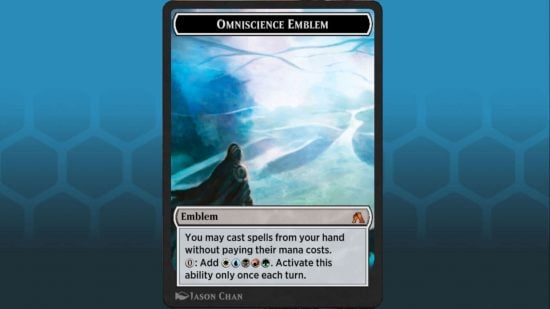MTG Arena Omniscience draft is a custom limited format in which every player has an Omniscience emblem, allowing them to play cards from their hand for free. This quick guide explains how to get the most value out of that powerful ability, and which cards you should prioritise when drafting.
Because Omniscience removes the main limit on how fast you can play your cards, it makes another aspect of MTG strategy – card advantage – much more important. This makes it a great learning experience for players who are just learning how to play MTG, and particularly how to play MTG draft.
The Omniscience emblem
The Omniscience emblem allows you to cast spells from your hand without paying their mana costs. This means you can cast any spell, and put anything you draft into your deck, without worrying about your mana curve or how greedy you’re getting with multiple colors of card.
Be careful to note that the mana cost of activated abilities on cards aren’t discounted. That includes MTG Cycling, Channel, Dash and similar abilities you can use on a card while it’s still in your hand – they’re not casting costs, so Omniscience doesn’t discount them.
You can only cast free spell from your hand, not from other zones like exile. So if you send a creature on an Adventure, or Foretell a card, you won’t be able to cast it for free later.
You do have a reliable source of mana: the Omniscience emblem has an activated ability that, once per turn, gives you one of each color of mana. When drafting, remember this limit – you most likely won’t be able to use an activated ability or cast a spell from exile that costs more than five mana, or requires two or more mana of the same color.
While it’s possible to include lands and MTG mana ramp spells in your Omniscience deck, the only reason to do so is to pump up a spell with a casting cost X, or to use an especially expensive activated ability. This isn’t worth it: the mana generation will only very occasionally be useful, and will replace a spell card that could be literally anything.
Card advantage
The most important resource in Omniscience draft is cards: how many do you have in hand, and how many have resolved into permanents on the battlefield? If you have more than your opponent, you have card advantage.
While card advantage is very important in conventional draft, you ordinarily have to weigh it against the mana cost of a card, and whether it fits into your deck at all. A card that costs seven or more mana and draws three cards might be playable normally, if you’re in a ramp deck or are sure you can make the game run long – but in Omniscience draft it’s an absolute bomb.
Card draw spells and hand attack spells are incredibly powerful in Omniscience. As a general rule, if a card lets you draw two or more cards, you want it. If it makes an opponent discard two or more cards, you also want it (though, if the game runs long, this is weaker than drawing your own cards).
Cards that do something and draw you a card, whether that’s a combat trick, letting you scry, or summoning a 1/1 creature, are effectively free, so while they may not be impressive, they’re never a bad thing to include in your deck. The same is usually true for cards that do something and force your opponent to discard a card.
Permanents and removal
You can cast the most ungodly and expensive permanents in Omniscience, but bear in mind that your opponent has free access to their removal spells. This exaggerates many of the normal rules of drafting creatures: MTG Hexproof is better than usual, as are abilities that trigger when the creature enters the battlefield or dies. One sacrosanct draft rule goes out the window – two drop creatures don’t matter at all.
Unconditional counterspells are a better form of removal in Omniscience draft than in usual play. You don’t have to worry about holding up mana to use them, and their ability to cancel a spell before it resolves might cancel out an enter-the-battlefield ability or an effect that draws multiple cards. Board sweeper spells are better than regular removal, again because they take out so many creatures for just one card.
While you have all the mana in the world in Omniscience, you can still play cautiously – not every creature needs to go to the board, at least until you know what’s in your opponent’s hand, or you’ve taken their hand apart.

If you and your opponent are equally matched for card advantage, you’ll end up playing a full game with a whacky selection of busted creatures – see YouTuber NumotTheNummy’s draft video above for a sense of how bonkers the game can get. But if you can beat your opponent on card advantage, the match will most likely end with a scoop.
In some regards, Omniscience is just a little bit like the Legacy format – mana is plentiful, there are hardly any lands on the board, free counterspells are everywhere, and the game might be decided by turn two. It’s a blast!
At time of publication, Omniscience draft is the current Midweek Magic event, and free to join. If you haven’t already tried out MTG Arena, it’s a great free to play platform for the TCG – the whole Wargamer staff plays, and it recently reignited Mollie Russell’s love for MTG, after a multi-year hiatus from paper magic. We have guides to the current best MTG Arena decks, as well as MTG Arena codes to unlock some free packs to build your collection.
Source: Wargamer




